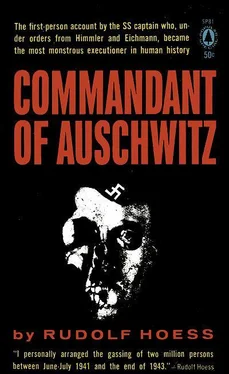I was unable to come to a decision for a long, long time. This was quite unlike my usual self.
The temptation of being a soldier again was, however, too strong. Stronger than my wife’s expressed doubts as to whether this profession would really give me complete fulfillment and inner satisfaction. But when she saw how deeply I was drawn to a soldier’s life, she finally agreed with my wishes.
Because of the reasonably certain prospect of rapid promotion and the financial emoluments that went with it, I became convinced that I must take this step. But at the same time I felt that I could still keep to my aim of ultimately settling down as a farmer.
This aim in life, a farmstead home for ourselves and our children, was one which we never lost sight of. Even in the years to come I never changed my mind about this. It was my intention to go back to farming immediately I was retired from active service after the war.
It was only after many doubts and hesitations that I finally decided to join the active SS.
Today I deeply regret having abandoned my previous way of life.
My life and that of my family would have taken a different turn. Even though today we would be equally without a home and without a farm, yet we would in the meantime have had several years of soul-satisfying work.
Yet who is able to foresee the intricate course of a man’s destiny?
What is right? And what is wrong?
When I read Himmler’s invitation to join the ranks of the active SS as a member of the unit guarding a concentration camp, I gave no thought to the reference to concentration camps. The whole idea was too strange to me. It was quite beyond my powers of imagination. In the seclusion of our country existence in Pomerania we had hardly heard of concentration camps.
To me it was just a question of being an active soldier once again, of resuming my military career.
I went to Dachau.
Once more I was a recruit, with all the joys and sorrows that that entails, and soon I was myself training other recruits. The soldier’s life held me in thrall. [24] The SS unit that Hoess joined as SS-Unterscharführer (corporal) on December 1, 1934, had been formed earlier that year by Theodor Eicke under the name of Guard Unit Upper Bavaria as part of the General SS. From the end of June 1933 Eicke had been Commandant of Dachau. In that same year Eicke drafted the Disciplinary and Punishment Regulations for use in concentration camps, and also the regulations for the guard units in the camps. In May 1934 Eicke was given the job of rationalizing the concentration camps, some of which, such as Oranienburg near Berlin, had been set up by the SA, while others, such as Dachau, were run by the SS. Eicke played a very prominent part in the murder of Roehm and his followers and the elimination of the SA as a political force on June 30, 1934, and in the following month was appointed Inspector of Concentration Camps and of the Death’s Head Formations, into which the Guard Unit Upper Bavaria was now incorporated. For Hoess’s views on Eicke, see Appendix 8.
During our training, we were told about the “enemies of the state” (as Eicke, the Inspector of Concentration Camps, called them), that is to say the prisoners behind the wire. We were given instruction concerning our relations with them, and their custody, and the use of our arms. It was impressed on us how dangerous these prisoners were.
I observed them at work and as they marched in and out of the camp, and I heard a lot about them from those of my comrades who had served in this camp since 1933.
I can clearly remember the first flogging that I witnessed. Eicke had issued orders that a minimum of one company of troops must be present during the infliction of these corporal punishments.
Two prisoners who had stolen cigarettes from the canteen were sentenced to twenty-five strokes each with the lash.
The troops, bearing arms, were formed up in an open square, in the middle of which stood the whipping block.
The two prisoners were led forward by their block leaders. Then the commandant arrived. [25] The commandant was responsible for the concentration camp as a whole. The SS officer responsible for the camp in which the prisoners were kept was called the Schutzhaftlagerführer (commander of the protective custody camp), whose chief assistant—and the SS official with whom the prisoners came most directly in contact—was called the Rapportführer. Under him were the SS non-commissioned officers responsible for the various blocks, originally called companies.
The commander of the protective custody camp and the senior company commander reported to him.
The Rapportführer read out the sentence and the first prisoner, a small, impenitent malingerer, was made to lie across the block. Two soldiers held his head and hands and two block leaders carried out the punishment, delivering alternate strokes. The prisoner uttered no sound. The other prisoner, a professional politician of strong physique, behaved quite otherwise. He cried out at the very first stroke, and tried to break free. He went on screaming to the end, although the commandant shouted at him several times to be quiet. I was stationed in the front rank and was thus compelled to watch the whole procedure. I say compelled, because if I had been in the rear of the company I would not have looked. When the man began to scream, I went hot and cold all over. In fact the whole thing, even the beating of the first prisoner, made me shudder. Later on, at the beginning of the war, I attended my first execution, but it did not affect me nearly so much as witnessing this corporal punishment. I am unable to give an explanation of this.
Corporal punishment was standard practice in the prisons up to the 1918 revolution, but was then abolished.
The guard who had always carried out this punishment was still in the prison service and was nicknamed “the bone-breaker.” He was a rough, dissolute fellow, always reeking of alcohol, who regarded prisoners as no more than numbers. He was just the man for the job. When under arrest I had seen the block and the whips in the punishment cellar, and I felt my flesh creep as I pictured the “bonebreaker” at work.
After this first experience I always took care to be in the rear rank when, as a private soldier, I had to attend these whippings.
Later, as block leader, I avoided them as best I could or at least always left the parade before the actual whipping began. [26] On March 1, 1935, Hoess was made block leader at Dachau, being promoted SS-Scharführer (sergeant) on April 1 and SS-Oberscharführer (staff sergeant) on July 1, 1935, and SS-Hauptscharführer (sergeant major) on March 1, 1936. From April 1, 1936, until September of that year he was Rapportführer at Dachau. In June 1936 Himmler and Bormann visited the camp, and Hoess was specially recommended for promotion both by the commandant, Loritz, and by his predecessor, Eicke. Himmler and Bormann both being aware of his “past services,” he was promoted SS-Untersturmführer (2nd lieutenant) on September 13, 1936, thus becoming a member of the SS officer corps. From September 1936 until May 1938, when he was transferred to Sachsenhausen concentration camp, he was Effektenverwalter, that is to say, the officer responsible for the administration of stores and of prisoners’ property, at Dachau.
I found it easy to do this, for some of the block leaders were only too eager to attend. As Rapportführer, and later as commander of the protective custody camp, I was forced to be present, much as I disliked it.
When I became commandant and therefore responsible for ordering corporal punishment, I rarely attended in person. I certainly never ordered it without first giving the matter very careful consideration.
Читать дальше












